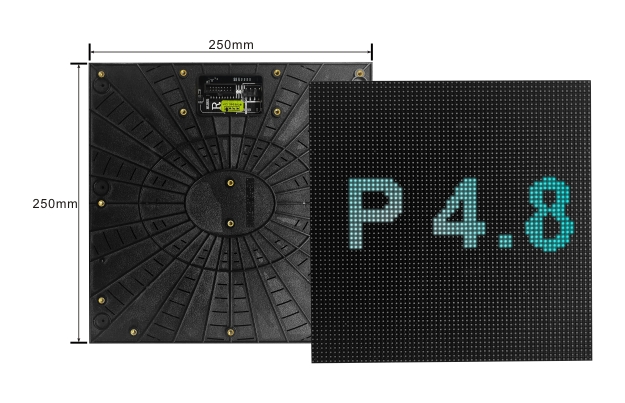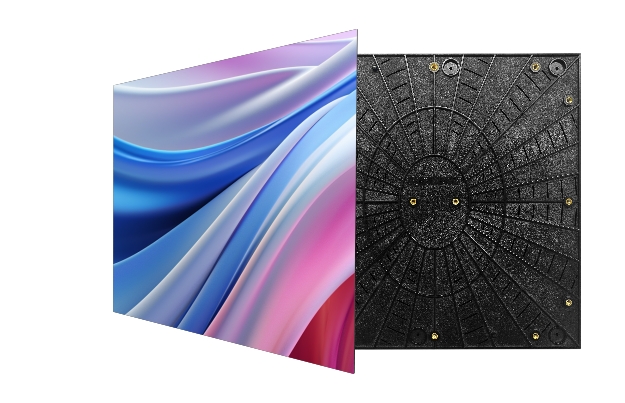P4.8mm LED Module
P4.81mm Indoor LED Screen Module 250mmx250mm
- Data sheet
- REMARK
- TECH ARTUCLES
| Value | |
| Pixel Pitch | 4.81 |
| Module Size(mm) | 250*250 |
| Module Pixel | 52*52 |
| Brightness | 1000 |
| Pixel Configuration | SMD2121 |
| Colors | 281trillion |
| Refresh Rate (HZ) | ≥3840 |
| Pixel Matrix Per Sq.m | 43264 |
| View Angle (H/V) | 140/140 |
| Power Comsuption(max/avg) | 400/150 |
| IP Rate | IP40/20 |
| Input Voltage (AC) | 110/240 |
| Operating Temp. | -20-60 Celsius degree |
| Operating Humidity | 10-95% RH |
| Control Distance | Ethernet cable 100m, optical fiber 5km |
| Support VGA Mode | 800×600,1024×768,1280×1024,1600×1200 |
LED module, also known as LED light board, is the smallest detachable component unit of LED display application level. Generally consists of LED lamp beads, signal output inlet, chip, kit, pcb substrate and power output inlet.
LED module, is the main light-emitting component of the LED box, all the components of the LED box are designed to ensure the normal and stable work of the LED module.
Indoor LED Screen Module Manufacture &Aging Test
Our LED modules not only provide superior lighting effects, but also have excellent contrast capabilities.
The high contrast of LED modules makes the image sharper and clearer, allowing viewers to better appreciate every detail in the image.
Compared to traditional lighting products, LED modules have a higher contrast ratio and are able to present more realistic and vivid colors, creating a more lifelike visual experience.
Whether it’s on an outdoor billboard, a mall display, or an indoor video wall, our LED modules provide excellent contrast performance to make your content unique and eye-catching.
By utilizing our LED modules to the fullest, you can display higher-quality images, attract more attention, and enhance your brand image for greater market competitiveness.

In the aging test, we expose the LED module to an environment of high temperature, high humidity, and high pressure, and run it continuously for a period of time to simulate long-term working conditions under actual use. Through this aging test, we can evaluate the stability, reliability and lifespan of the LED module.

In testing, we focus on the following aspects:
1. Brightness stability: Whether the brightness of the LED module remains stable without any obvious attenuation after long-term operation.
2. Color retention: Whether the color of the LED module is durable and whether there will be obvious color shift.
3. Light attenuation: the degree of light attenuation of the LED module and whether it meets the product performance indicators.
4. Power supply stability: Whether the LED module can work stably at the set voltage and current to ensure normal operation for a long time.

Through these tests, we can determine the stability and life of the LED module, discover and correct possible problems in a timely manner, and ensure that product quality meets customer needs.









